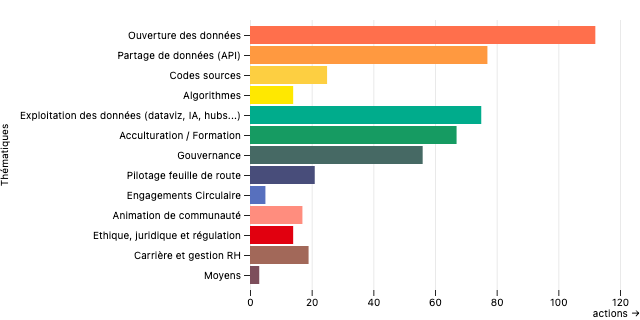
15 ministerial strategies and 500 actions to accelerate public policy on data, algorithms and source codes: this is the result of the mobilization of all ministries on these three themes, resulting from a request from the Prime Minister. The roadmaps were unveiled on September 27. ActuIA offers a condensed summary of all the measures taken by the ministries on the issue of data.
The first ministry’s call for mobilization on the issue of data, algorithms and source codes
On April 27, the first ministry called on all ministries and reiterated the government’s ambition to exploit, open up and circulate public data, algorithms and source codes. Over the next five months, each ministry, in conjunction with its decentralized departments and operators and with the support of Etalab, drew up a roadmap for two to three years.
Each ministry has its own strategy highlighting what data can improve public policies, the actions to be taken and their timetable, as well as the governance set up to ensure their implementation. Thus, an interministerial framework for the administration of data, algorithms and source codes has been drawn up by the General Administrator of Data, Algorithms and Source Codes, which defines in particular the overall vision and doctrine in which these strategies must fit.
In addition, on May 15, 2010, departmental data administrators (DDAs) were appointed in all departments. They coordinate the network by supporting the Etalab department. Each MDA has built a network of correspondents in the business divisions within its scope. Below is a list of all the AMDs as of 15 May 2021:

What are the objectives for data administration and what framework for action and service provision?
In order to set up a public policy on data, the government started from the principle that the main challenge was to transform public action in such a way as to make it more transparent (access to data that can be analysed for citizens), to produce a better public service (services better adapted to the needs of users, better user experience for administrative procedures) and to make it more efficient, more helpful, and to create economic value.
Thus, in order to achieve the ministries’ ambitions in terms of data, algorithms and source code in the administration, each structure will have to pursue the following objectives:
- Ensure the simplification of administrative procedures for which it is responsible, by applying a procedure that consists of using data already available within the State rather than asking users for it again, and contribute itself to making its data available to other administrations so that they can apply this same principle.
- Make the data sets, algorithms and source codes it produces available spontaneously, while seeking a level of quality, interoperability and availability adapted to the uses identified, and integrate this objective as far upstream as possible in the design of information systems and services.
- Guarantee a level of quality of service in terms of the availability of access to APIs.
- Participate in the pooling and quality improvement of essential data, by contributing to the extension of reference data and facilitating their reuse by other administrations and civil society.
- Leverage data as much as possible through data science and artificial intelligence to
to improve public action and decision-making - Contribute to the implementation of sectoral or cross-sectoral data hubs,
to facilitate access to data covered by legal secrets to stakeholders with the right
stakeholders with access rights, and to inform the decision-making of government and
governmental and administrative authorities. - Promote the growth of research in France through the development of shared knowledge, by responding without delay to any request from public sector researchers seeking access to public data sets.
500 actions included in the 15 ministerial roadmaps
To meet all these objectives, 500 actions covering the entire life cycle of the data have been identified in the 15 roadmaps proposed by each ministry. Below, you will find the number of actions related to each theme:

As can be seen, initiatives directly related to openness (22%), sharing (15%) and data exploitation (15%) are among the most frequent actions. Making public data available in open data is a strong axis of many ministerial roadmaps. Data sharing between authorized administrations is at the heart of the roadmaps, supported by strategies linked to APIs, prioritized according to the use cases identified by the various ministries.
Many ministries are open to the development of data catalogues, coordinated by the interministerial digital directorate (DINUM), which are intended to be shared with other organizations in order to facilitate collaboration and data sharing. Actions will aim to strengthen the exploitation and valorisation of the data they hold and produce and to develop existing sectoral data hubs (such as Health Data Hub, AgDataHub, Labor Data Hub, Education Data Hub, etc.).
Several types of support and development of data-related skills
Several ministries wish to appoint referents dedicated to algorithmic processing. Thus, DINUM, which already supports administrations, will continue its action by leading a working group dedicated to public algorithms within the network of ministerial administrators of data, algorithms and source codes, by supporting ministries in the use of existing tools and by proposing new first-level support tools.
As for the source codes published by the administration, they will be systematically referenced and presented on the future code.gouv.fr site. The interministerial open source software base and the GouvTech catalogue will help the administration to make a reasoned choice to use open source software, by helping it to measure the relevance of the available solutions, whether or not they are already in use.
Actions will be designed to acculturate and strengthen the expertise of agents on data-related issues: awareness-raising events and theme days, training programmes, coordination of expert networks, sharing of skills and best practices, awareness-raising of senior managers on the potential of data, etc.
In the future, all roadmaps will be updated to allow for the involvement of more internal stakeholders as well as civil society.
Translated from L’ensemble des ministères de France ont été mobilisés afin de définir leur stratégie en matière de gestion de la data









